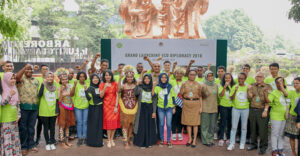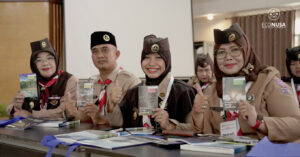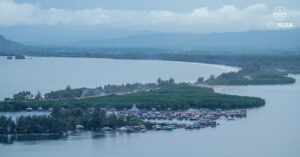
Religious Tolerance Index (RTI) 2019 released by the Religious Affairs Ministry names West Papua at the top among 34 provinces in Indonesia. The RTI Index of West Papua is 82.1 far exceeding the average national score of 73.83. The following positions are for East Nusa Tenggara, Bali, North Sulawesi, and Maluku. In comparison, Jakarta as the melting pots cosmopolitan scores only 71.3 which is below the average index.
RTI score is determined by several factors. These factors, among others, include correlation among domestic education, domestic income, religion heterogony, local wisdom implementation and role of the Religious Affairs Ministry. In the context of West Papua Province, the determinant has corelated with the deep-rooted local wisdom. Such a condition has been the daily portraiture of peoples in Fakfak Regency with the concept of One Furnace Three Stones. This is deemed the philosophy of harmony amidst the plural community.
Based on the publication of Fakfak Regency in Figure (2020), Fakfak Regency had 78,686 populations in 2019. Most of the populations or 43,696 are Islam believers. The rests are of the believers of Protestant Christianity (16,819), Catholic (15,027), Hindu (21), and Buddha (10). The populations of Fakfak are located in 149 villages in 17 districts.
In addition to the native peoples, Fakfak populations are comprised from various ethnicities who have existed long before the State of Indonesia’s birth. As to Saidin Ernas in Simbol Politik dan Harmoni Sosial: Makna Satu Tungku Tiga Batu dalam Dinamika Politik Lokal di Fakfak Papua Barat (Political Symbol and Social Harmony: Meaning of One Furnace Three Stones in Local Politics Dynamics in Fakfak, West Papua, 2015), the immigrants from Maluku and Arab set their steps in Fakfak in the 17th century through trading and religious missionary.
Read also: Idul Fitri in Tanah Papua, No Marching Tradition for Silaturahmi due to Pandemic
Bugis, Makassar and Buton ethnicities arrived when the government of Indonesia had established. They resided in Fakfak during the ongoing integration process of Papua and Indonesia. The immigrants from Java arrived at Fakfak as transmigrated populations in 1996.
The congregating various religions and cultures have created tolerance and respect through the daily life of Fakfak. Saidin recorded that there are bakubantu/masohi tradition by which peoples share each other’s helps to, even, construct religious buildings despite their different faiths. There is tombormarge culture in by which peoples help each other any religious activity. The slogan of One Furnace Three Stones has generated tolerance among the plural society without eliminating the other believers.
Abbas Bahambah, a notable culture expert from Fakfak, said that Mbaham Matta Wuh Tribe uses furnace with the circular supports of three large stone to cook. Furnace is the symbol of life. Three stones mean the relations among “you”, “I”, and “s/he”.
According to Daud Alfons Pandie in Konsep “Satu Tungku Tiga Batu” Sosio-Kultural Fakfak sebagai Model Interaksi dalam kehidupan Antarumat Beragama (A Socio-cultural Concept of “One Furnace Three Stones” of Fakfak as an Interaction Model for Religious Life among Believers, 2018), a furnace represents soil. As to Fakfak peoples, soil means the place of all living creatures reside. Three Stones are the symbols that uphold social life of the community such as customary tradition, government and religion.
Read also: Sinara, Respecting Ancestors and Conserving Nature
Heru Suroto, a researcher of Papua Archeology, asserted that Fakfak people considers three religions, Islam, Catholic and Protestant Christian as the family religion. It is a common practice in which a family has three different believers. “Thus, it comes up with the slogan of ‘One Furnace Three Stones, One Heart One Brotherhood’ to have profound harmony among neighbors,” said Heru.
As to Heru, the high tolerance among Fakfak peoples is reflected from the architecture of Patimburak Mosque at Patimburak Village, Kokas District. King Pertuanan Wertuar constructed the Patimburak Mosque in 1870 by bringing mosque and church together. “When observed from far, the mosque appears like a church. The dome is like the European church architectures,” Heru added.
The daily implementation of One Furnace Three Stones in life is thought-provoking. Abbas said that the Christian believers are in charge of a committee in Idul Fitri celebration. On the other occasion, the Moslems will be in charge of the commemoration of Christmas. Lending a hand beyond interfaith also happens during the hajj pilgrimage rites as well as ordain ceremony at church.
“What makes different is the religious rites. People of different faith will surely not involve in other’s rites. We have vacation, pay each other visit during the religious festivities because there are various religious believers within one clan. This is the form of harmony,” said Abbas.
Read also: Urgent Call for Religious Leaders to Save Indonesia Rainforest
Harmonious life also happens to 604 peoples residing at Air Besar Village, Central Fakfak District, Fakfak Regency. Most of the populations are of Protestant believers. There are only 6 Moslems. During fasting month, Halim Samsyu, one of the residents of Air Besar Village, got food from non-Moslem. On Idul Fitri festivity, Halim invited the residents to have meal at his house.
“I have relatives who are Protestant and Catholic devotees. It is only me who is Moslem. So, in my family, I allow them to use my house to perform Christianity rites,” said Halim, the Village Chief since 2015.
Not only in Fakfak, religious harmony also happens to Kambala Village, Buruway District, Kaimana Regency in West Papua Province. The Mangrove Expedition Team last year got an opportunity to talk to Amiruddin Kamay, an Islamic teacher. As to Amiruddin, the villagers in Kambala live in harmony by cognizant knowledge of a family of fellow mankind concept.
“As human being, we are of the fellow mankind family. But a family of different faith is different topic. But as fellow mankind, we are of one family and harmony should prevail. Such harmony should be preserved among different faiths, individuals or ethnicities. If we live in disharmonious way, our life is not plausible. We need peace to live our lives,” Amiruddin asserted.
Editor: Leo Wahyudi







